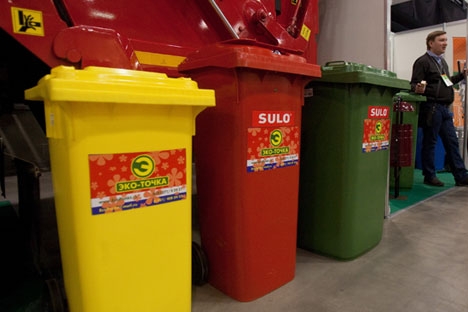
Experts note, that Russians have been worried about more global issues in conservation, such as waste processing and energy saving. Source: ITAR-TASS
Following her studies in Dublin, Ireland, Julia started actively collecting the plastic packaging of different products, to hand them over for processing. It turned out, however, that finding a place in Moscow where plastic is accepted for processing is not an easy task.
One such station was discovered after prolonged searches at Artplay, a modern art center. The remaining utility waste collection stations in Moscow are prepared to accept only paper waste for processing.
According to experts, this is far from being the only instance of a citizen’s effort at being environmentally conscious. "We have been rendering environmental services to individuals inter alia for 15 years already. A sharp increase in the population’s interest in their personal environmental security and environment protection has occurred over the last 6-7 years," Nikolai Krivozertsev, the director general of Ecostandard Group, says.
"Nowadays, more interest in personal security matters is shown. In particular, people wonder about food, construction and decoration materials, household appliances, and the situation in city districts, so as to make their choice while buying residential spaces," says Krivozertsev. As noted by the expert, over the last 2-3 years, people have been worried about more global issues in conservation, such as waste processing and energy saving.
Alexander Minin, chief of the Scientific Design Department for Natural Complex Preservation and Development at the Institute of Moscow Master Layout Plan, agrees with Krivozertsev. Minin, however, is sure that only Muscovites are interested in ecology, while residents of Russia’s regions are indifferent to the problem.
"The wealthier the region is, the more attention is paid to the ecology. People get more interested in the ecology in Moscow, but that is far from being the whole of Russia," he says.
For example, the matter of ecology in St. Petersburg — second to Moscow in terms of population — is of much less interest than it is in the capital. Alexander Stakanov, the head of the Department for Consulting on Management Systems in GCE Group, says that mobile stations for collecting things such as mercury lamps, thermometers, used batteries and expired pharmaceuticals had operated in the city as an experiment, but with rather insignificant use. St. Petersburg residents were also indifferent to separating waste for recycling.
"The state and municipalities try to do something, but it's the head where the problem lies. Our citizens haven't yet reached such an ecology-consciousness level. Maybe the population does not have sufficient general information as to where they should go, say, with all broken thermometers. On the other hand, if a home’s kitchen space is 6 square meters [65 square feet] or less, what separate waste collection may be mentioned? There is no space for three buckets," says Stakanov.
In addition, Stakanov has doubts about production enterprises being bona fide. "Experts introduce ecology management systems at major enterprises, and they cannot but hope that all system elements would operate without fail. It's impossible to know exactly, or to verify, whether or not the same specialized entities should duly utilize hazardous substances, pour our reagents out in the backyard," he says.
Despite the growing interest to ecology, the scandal with the detention of Greenpeace activists who tried to get to the Prirazlomnaya platform to protest for Arctic protection attractedonly minor interest from the Russian population. Experts explain that Greenpeace is perceived by Russians as a political organization rather than an ecological one.
"Such organizations have no care of specific people safety; it's scandal in which it is interested. Our people do understand that. People do not associate Greenpeace detention with their personal environmental security prejudice," Krivozertsev says.
"Should it concern organizations seeking to improve the ecology, or to sell eco products or engage in waste utilization on a daily basis, then a social protest might have appeared."
Minin believes the abrupt reaction of authorities to the actions of the ecology organization activists was only due to potential effects on an economically important industry. Moreover, there is a lot of noise being made on the issue, but a lack of specific efforts on officials' part, the expert notes.
"The state is rolling over to the ecology, but somehow can’t finish this roll,” says Minin. “Ecology priority is constantly talked about, on the one hand, but everything hinges on the economy. This is a very costly activity direction, and nobody wants to invest in it very much. First and foremost, ecology attracts the attention of Western market-oriented companies concerned about their image.”
All rights reserved by Rossiyskaya Gazeta.
Subscribe
to our newsletter!
Get the week's best stories straight to your inbox